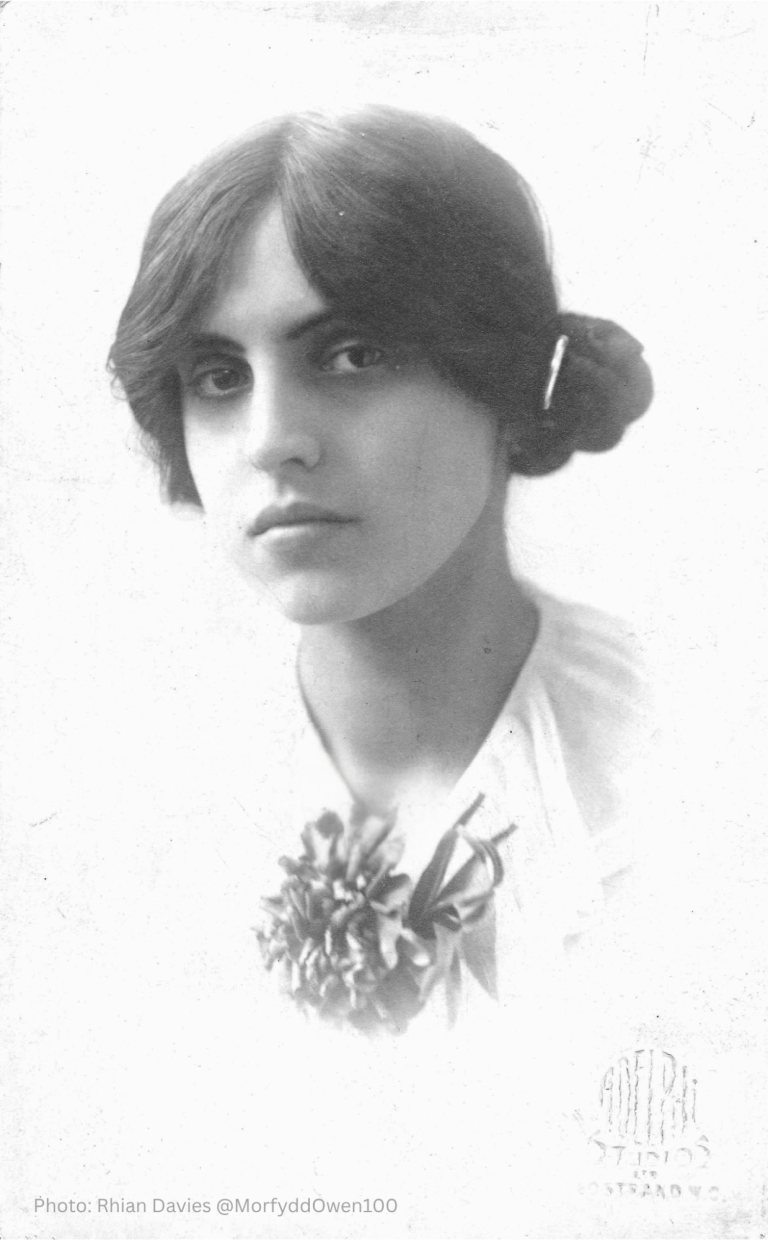Morfydd Owen (1891–1918)
Composer; Pianist; Singer; Musicologist

Works published by MoV
He prayeth best who loveth best (S & piano or organ)
He prayeth best who loveth best (arranged for SATB by Sarah MacDonald)
He prayeth best who loveth best (S & piano or organ version)
He prayeth best who loveth best (arranged for SATB by Sarah MacDonald)
He prayeth best who loveth best (S & piano or organ)
The compact stanza used in this setting by Morfydd Owen is taken from the final section of Samuel Taylor Coleridge’s complex extended poem The Rime of the Ancient Mariner (written and adapted by the poet between 1797–1816) and develops out of a seemingly simple statement in the previous stanza:
He prayeth well, who loveth well
Both man and bird and beast.
He prayeth best who loveth best (arranged for SATB by Sarah MacDonald)
Morfydd Owen (1891–1918)
Born into a musical family in Treforest, Glamorgan, on 1 October 1891, Morfydd Owen started composing at the age of six. She followed the traditional Welsh apprenticeship of chapel and eisteddfod performances – winning multiple prizes and earning regular plaudits in local newspapers - before entering University College, Cardiff, to study with David Evans as the first holder of the Caradog Scholarship, 1909-12. Morfydd played Grieg’s Piano Concerto in 1911 and heard 20 of her own compositions performed in departmental concerts including the fine song To Our Lady of Sorrows.
Morfydd might well have become a teacher if not for a chance connection with Eliot Crawshay-Williams, the Liberal MP for Leicester. Recognising the quality of her work, he persuaded Morfydd - and her parents - that she should come to London to study composition with Frederick Corder at the Royal Academy of Music, 1912-17. She gained the Goring Thomas Scholarship which had been founded in 1895 to promote ‘dramatic musical composition for the stage’, and even as a student, her orchestral works were highly praised for their ‘considerable power of invention and natural, as well as trained, gift’. (a)
In 1915, Morfydd was awarded a grant of £100 from the University of Wales Fellowship Fund to pursue her interest in ethnomusicology. She intended to travel and undertake ‘a critical study of the influence of folk-music on the musical life of a nation, with particular reference to Russia, Norway, and Finland, and the possibilities as regards Wales’ (b) - a remarkable proposal that should have enabled her to ‘soar still higher in the musical world’ (c) - but alas, the project never materialised because of the First World War and the Bolshevik Revolution. Instead, she remained at the Academy, where she worked as a Sub-Professor and began to take singing lessons alongside her classes in composition.
Morfydd’s songs convey a real sense of her voice and performance style - a lyric mezzo with a knack for pianissimo mezza voce – and she gave concerts in Bath and Oxford before making her professional début at the Aeolian Hall in New Bond Street on 10 January 1917. Her programme included Italian and French repertoire together with a group of her own settings including He prayeth best who loveth best, and the recital was very well received, one critic warmly observing that ‘[she] has astonished those who knew her as a student by her development as a singer’. (d)
By 1917, Morfydd had already produced about 250 works for the stage, orchestra, chorus, chamber and solo instruments, songs, hymns, folksong transcriptions and arrangements. Flamboyant, Bohemian, and readily acknowledged as a skilful and deeply musical composer and performer, her star was in the ascendant. But within a month of her success at the Aeolian Hall, Morfydd had married the Freudian psycho-analyst Ernest Jones. Their clandestine wedding at Marylebone Register Office on 6 February 1917 was attended by none of her family or friends and continues to exert a potent fascination.
Jones did not approve of his wife performing in public, so her musical diary soon dwindled dramatically. Her compositional output was also affected by serving as her husband’s secretary and proof-reader and organising the maids and meals at their West End flat and cottage in Sussex. These changes were particularly ill-timed because Morfydd was just beginning to achieve wider recognition through publications by Boosey & Co. and Chappell & Co. and performances by leading soloists such as Ben Davies at the London Palladium and Robert Radford at Mr Robert Newman’s Promenade Concerts (now the BBC Proms). ‘Oh dear!’ she wrote to Eliot Crawshay-Williams on 22 July 1918: ‘Married life doesn’t seem to me to be quite the easiest thing to adapt oneself to, and has taken up all my time’.
Morfydd’s life was cut tragically short on 7 September 1918 when she died at the age of only 26 from complications arising from an operation performed at Oystermouth near Swansea. Her premature death was widely lamented and her former Professors in Cardiff and London described her as one of the most brilliant of their many hundreds of pupils. Recent revivals of Morfydd’s compositions, especially the orchestral scores Morfa Rhuddlan at the Gregynog Festival (2014) and Nocturne at the BBC Proms (2018), have confirmed the significance of her achievement and led to performances and broadcasts of her music all over the world.
© Rhian Davies, 2018, with additions (MoV 2025)
(a) https://www.britishnewspaperarchive.co.uk/viewer/bl/0002672/19130320/107/0005
(b) https://www.britishnewspaperarchive.co.uk/viewer/bl/0000104/19150811/326/0008
(c) https://www.britishnewspaperarchive.co.uk/viewer/bl/0002889/19150731/055/0003
(d) https://www.britishnewspaperarchive.co.uk/viewer/bl/0000104/19170111/091/0003
Cardiff University Special Collections and Archives holds many handwritten scores produced by Morfydd Owen during her short but prolific career, representing 135 individual orchestral works, choral works, chamber works, piano-vocals, songs, and operas. The collection is in the process of being digitised and made freely available to view online for future research and enjoyment. (May 2025)
Samuel Coleridge Taylor: You can find out more about the life and works of Samuel Coleridge Taylor at: https://friendsofcoleridge.com/
Rhian Davies: Follow these links to find out more about Morfydd Owen’s life and works, and about festivals and other events which raise up music by Welsh composers
https://gwylgregynogfestival.org/